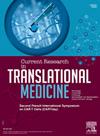Using machine learning to predict Hemophilia A severity
IF 3.2
4区 医学
Q2 MEDICINE, RESEARCH & EXPERIMENTAL
引用次数: 0
Abstract
Hemophilia A is a rare genetic condition that predominantly affects men and is characterized by a deficiency in Factor VIII clotting (FVIII). This research focuses on the development of a classification model to predict the severity of Hemophilia A, using data from point mutations in the FVIII protein. The study employs a variety of classification models, including RandomForest, XGBoost, and LightGBM, and performs a robust analysis of the data to select the most relevant features. The final model achieved an accuracy of 65.5 %, demonstrating significant performance against a simple gaussian naive bayes model that achieves 51.1 % of accuracy. Although the model cannot yet replace the FVIII measurement test in the blood for diagnostic purposes, the results represent a significant advance in Hemophilia A research. This work provides data analysis that deepens the understanding of the characteristics of the FVIII protein and contributes to the development of models capable of classifying the severity of this condition into its three possible classes: mild, moderate, or severe.
利用机器学习预测血友病A的严重程度
A型血友病是一种罕见的遗传病,主要影响男性,其特征是缺乏凝血因子VIII (FVIII)。本研究的重点是利用FVIII蛋白的点突变数据,建立一种预测a型血友病严重程度的分类模型。该研究采用了多种分类模型,包括RandomForest、XGBoost和LightGBM,并对数据进行了稳健分析,以选择最相关的特征。最终模型的准确率达到了65.5%,与达到51.1%准确率的简单高斯朴素贝叶斯模型相比,表现出了显著的性能。虽然该模型还不能取代血液中的FVIII测量测试用于诊断目的,但其结果代表了血友病a研究的重大进展。这项工作提供了数据分析,加深了对FVIII蛋白特征的理解,并有助于建立能够将这种疾病的严重程度分为轻度、中度或重度三种可能类别的模型。
本文章由计算机程序翻译,如有差异,请以英文原文为准。
求助全文
约1分钟内获得全文
求助全文
来源期刊

Current Research in Translational Medicine
Biochemistry, Genetics and Molecular Biology-General Biochemistry,Genetics and Molecular Biology
CiteScore
7.00
自引率
4.90%
发文量
51
审稿时长
45 days
期刊介绍:
Current Research in Translational Medicine is a peer-reviewed journal, publishing worldwide clinical and basic research in the field of hematology, immunology, infectiology, hematopoietic cell transplantation, and cellular and gene therapy. The journal considers for publication English-language editorials, original articles, reviews, and short reports including case-reports. Contributions are intended to draw attention to experimental medicine and translational research. Current Research in Translational Medicine periodically publishes thematic issues and is indexed in all major international databases (2017 Impact Factor is 1.9).
Core areas covered in Current Research in Translational Medicine are:
Hematology,
Immunology,
Infectiology,
Hematopoietic,
Cell Transplantation,
Cellular and Gene Therapy.
 求助内容:
求助内容: 应助结果提醒方式:
应助结果提醒方式:


